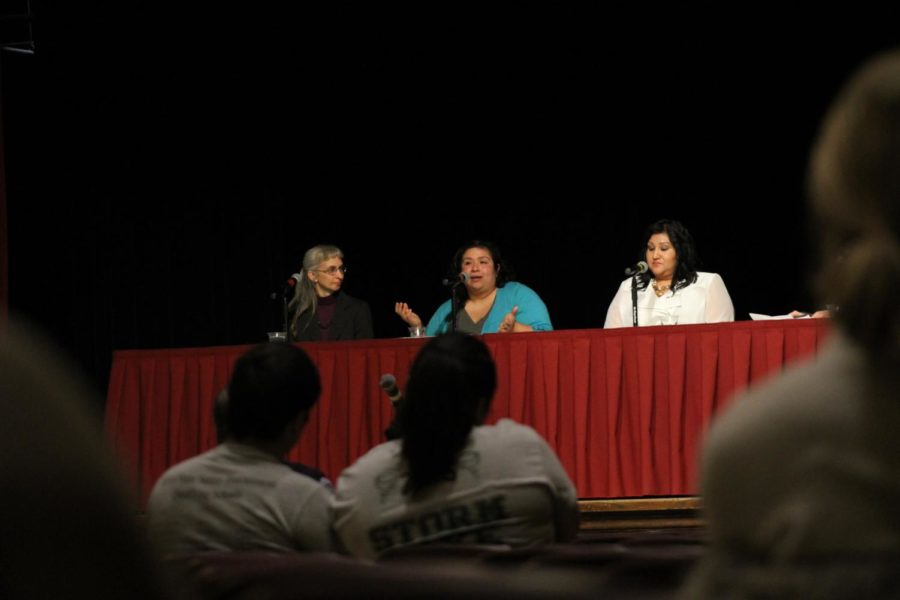Panel educates on the rights of immigrants
Sandra Zapata, Iowa Pride network coordinator, responds to a question about how the LGBTQ+ community and immigrant community can work together, saying we need to, “foster the idea of including everyone in the conversation.
January 24, 2017
In today’s political climate, with a new administration in office, immigrants — documented or not — are weary of what the future holds
“What Are Your Rights” — a discussion panel on the individual and constitutional rights of immigrants in the state of Iowa and at Iowa State — was hosted Tuesday night in the Memorial Union.
Liz Shannon-Mendez, diversity and inclusion project director in Hispanic and Latino affairs, opened the discussion by thanking those in attendance and stating the importance of immigrants knowing their rights, as well as realizing that there are resources available to assist them.
“I am also a proud immigrant from Ecuador,” Shannon-Mendez said before taking her seat.
Panelist Ann Naffier, an immigration attorney for Iowa Justice For Our Neighbors, an organization that provides legal services to low-income immigrants throughout Iowa, explained that changes made to immigration laws may not occur as quickly as many fear.
“The most recent main immigration law was passed in 1952,” Naffier said. “We’re going to have some warning.”
Naffier believes that it won’t be easy to prevent children of undocumented immigrants born in the United States from attending schools in the country because of the Supreme Court case Plyler v. Doe.
The Supreme Court would have to overrule itself, which is something Naffier doesn’t believe will happen.
“The [laws] that change quickly are executive orders,” Naffier said.
The panelists believed that the Deferred Action for Childhood Arrivals (DACA) and other immigrant programs can all be either eliminated or reformed by the new president.
DACA, which was put in place under the Obama administration, protects undocumented immigrants who came to the United States as children.
The program allows immigrants to obtain work permits. Others, such as H1B, a non-immigrant visa, allow U.S. companies to employ foreign workers.
Naffier warned individuals who have not signed up for their work permits not to sign up now.
“This isn’t the time,” Naffier said. “Wait a little bit and see where it goes.”
But she did suggest that those who do have the work permits continue renewing the permit as much as they can.
Rita Bettis from the American Civil Liberties Union (ACLU) also shared information regarding the constitutional rights that immigrants have.
“When in contact with law enforcement it is important to practice the practical,” Bettis said.
She explained that constitutional rights apply to immigrants, such as the right to remain silent, to not speak without the presence of an attorney and not to consent to search.
Bettis and other panelists all said that student immigrants deserve to be in a non-discriminatory school settings. Schools should be considered a safe haven for said students.
“There is very little intersect for advocacy for LGBT students and immigrants,” said Sandra Zapata of One Iowa. “I always tell people to put themselves in their shoes. We can’t silence people because we feel uncomfortable.”
One Iowa is an organization that works with immigrant and LGBT+ students. The organization originally formed in 2005 in support of gay marriage.
“If we unite, we are going to have more success,” said panelist Sonia Reyes-Snyder, community advocate for the Iowa Department of Human Services.
Her statement was met with nods from panelists and attendees.
The event flowed into questions from concerned community members, students and faculty during the last part of the discussion. Concerned attendees were reassured of uniting, being vocal toward Congress and local politicians and immigrants having a place in the United States.

















